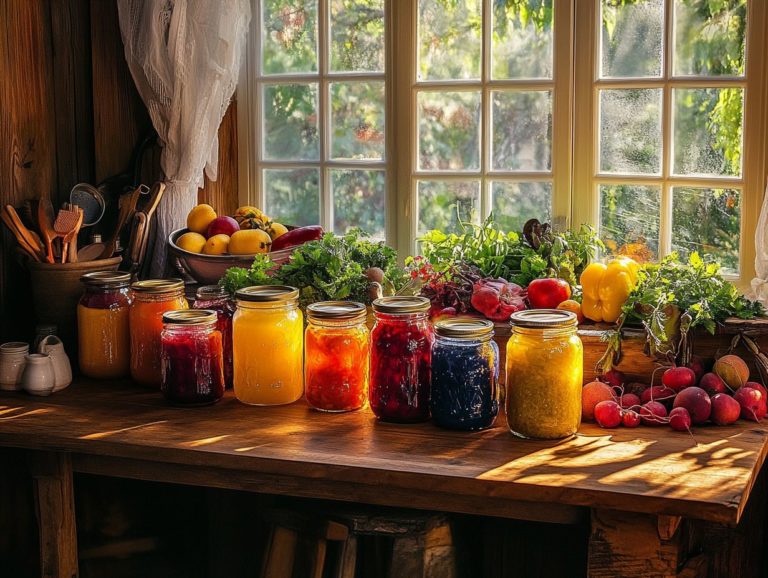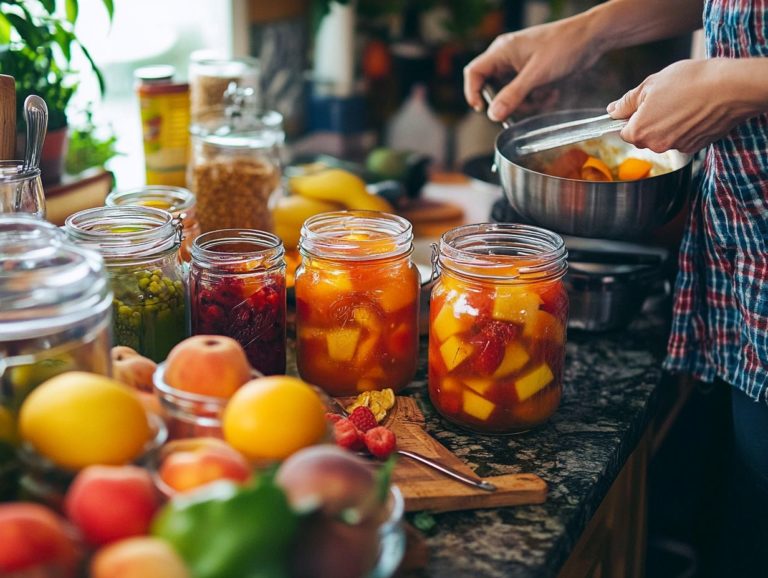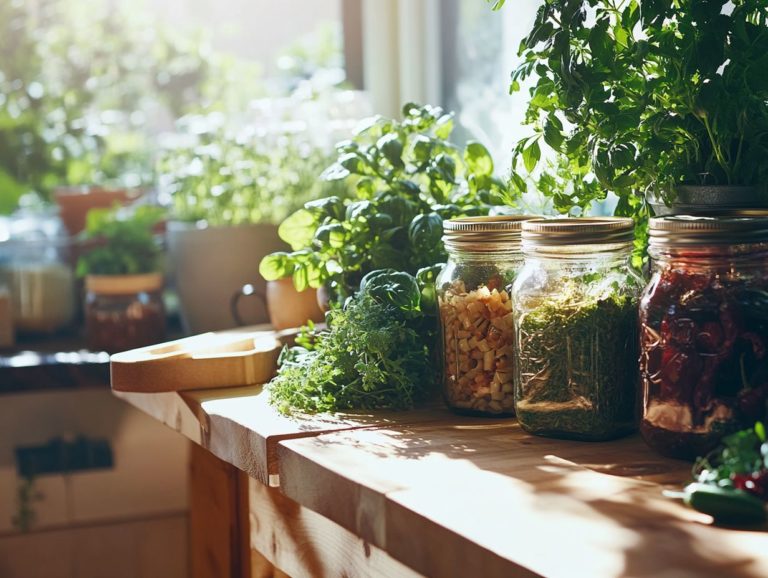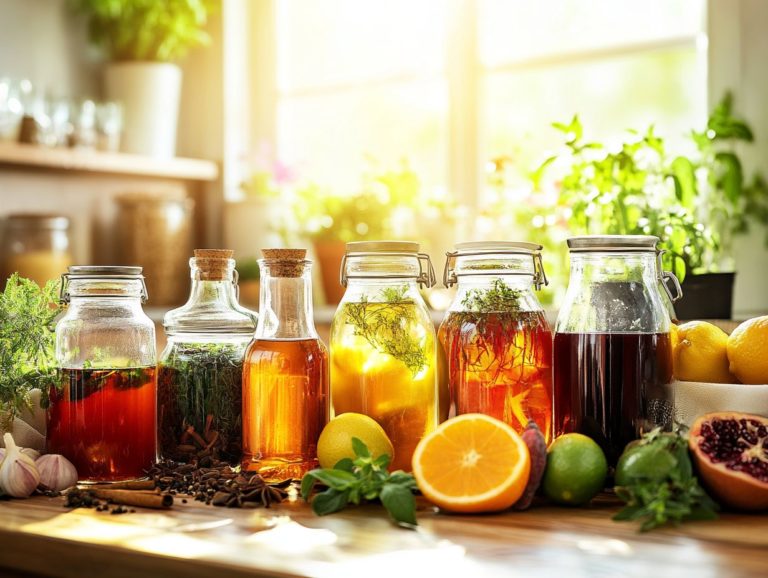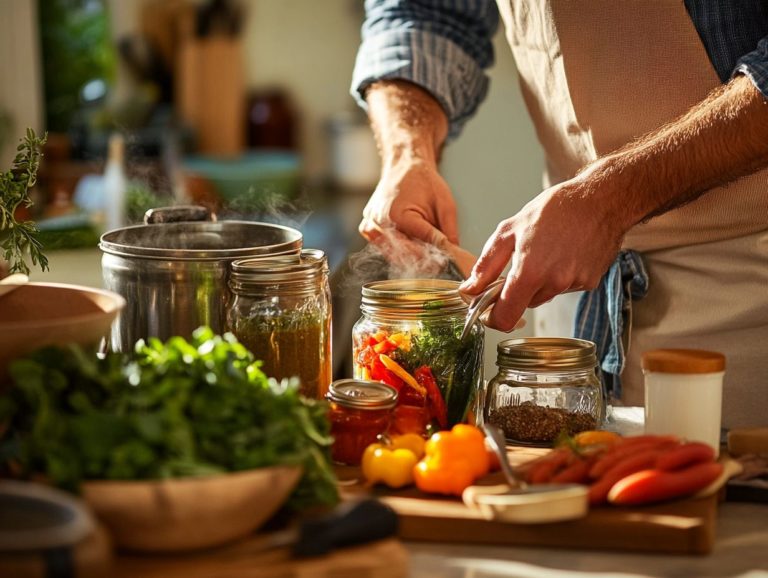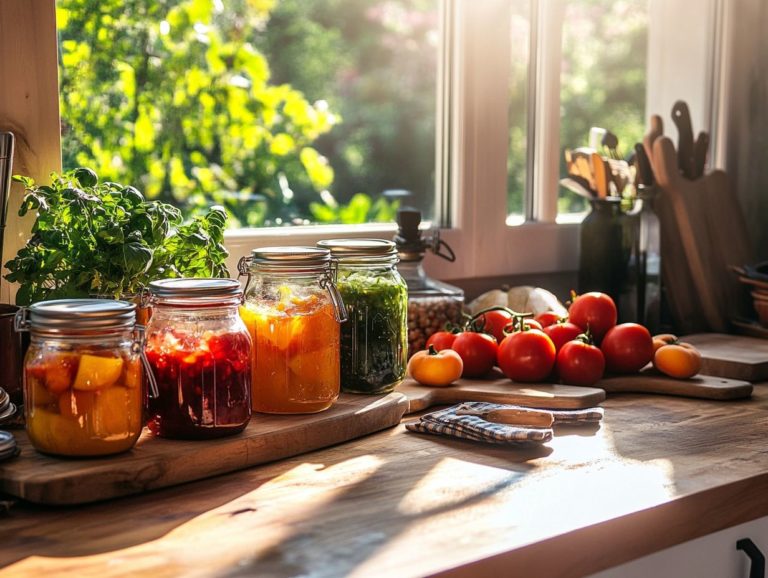How to Make Overripe Fruits Shine in Canning
Overripe fruits often get a bad rap. However, they are hiding a treasure trove of flavor and nutrition just waiting for you to uncover.
This article explores the causes and characteristics of overripe fruits. You’ll discover how to transform them into delightful canned goods.
Learn to identify the best fruits for canning. Master essential preparation and storage techniques to ensure you’re ready!
Contents
- Key Takeaways:
- Understanding Overripe Fruits
- Benefits of Using Overripe Fruits in Canning
- Identifying and Selecting the Right Fruits
- Preparing Overripe Fruits for Canning
- Methods for Canning with Overripe Fruits
- Storing and Using Canned Overripe Fruits
- Frequently Asked Questions
- What does it mean to can overripe fruits?
- Why should I can overripe fruits instead of throwing them away?
- How do I make overripe fruits shine in canning?
- What type of containers should I use for canning overripe fruits?
- Do I need to add any preservatives when canning overripe fruits?
- Can I can any type of overripe fruit?
Key Takeaways:
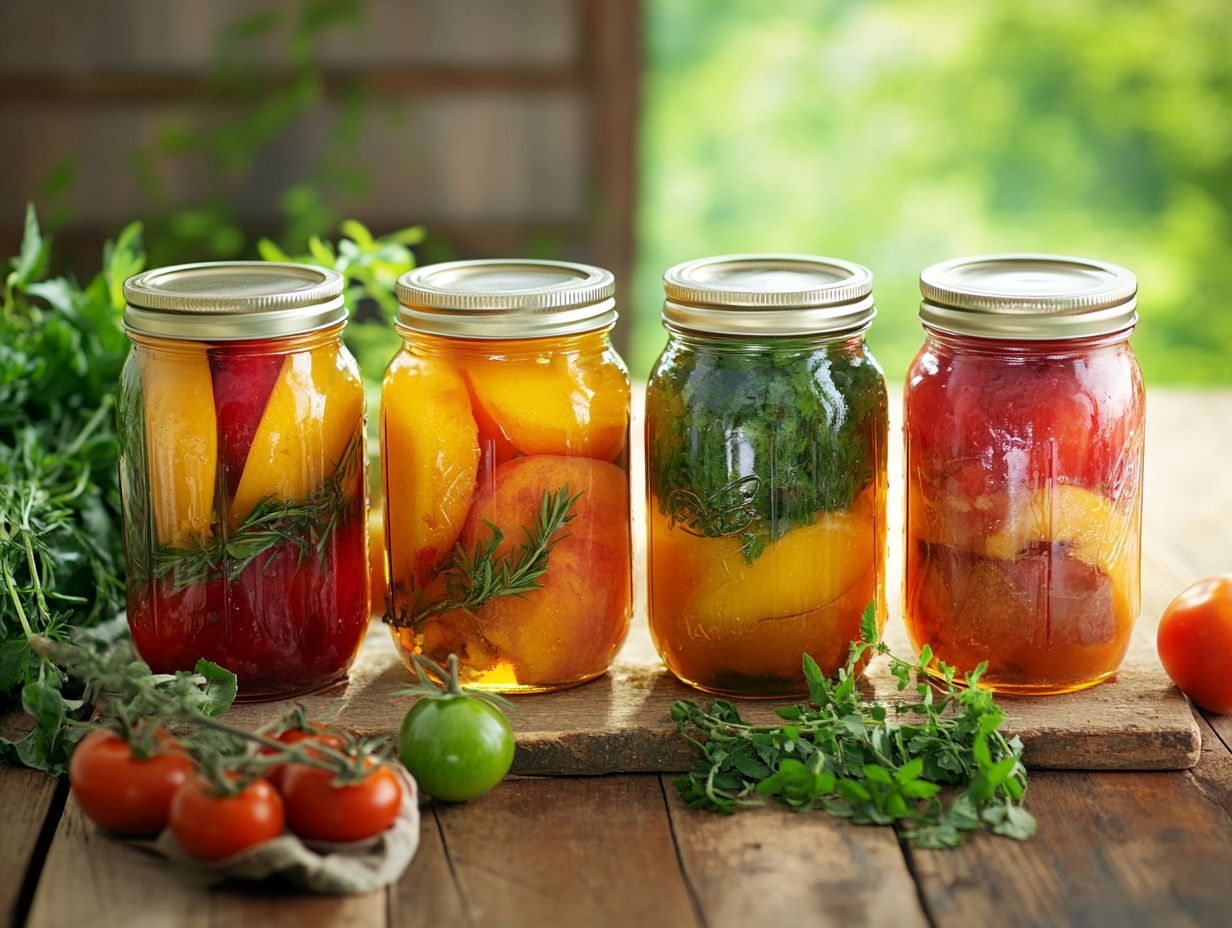
- Don’t toss overripe fruits – use them in canning for added flavor and nutrition.
- Choose the best overripe fruits and use proper cleaning and cutting techniques for successful preservation.
- Water bath and pressure canning methods effectively preserve overripe fruits for long-term storage.
Understanding Overripe Fruits
Understanding overripe fruits is vital for mastering canning, especially with delicious options like peaches, strawberries, and cherries. These fruits have distinct traits that influence their flavor, texture, and suitability for preservation.
Recognizing these traits helps you enjoy their natural sweetness and ensure a safe, tasty result. By spotting signs of ripeness and overripeness, you can select the ideal fruits for your canning projects.
Causes and Characteristics
Overripeness in fruits is caused by various factors, including environmental conditions and the natural ripening process. Warmth and humidity often speed up this process.
Warm temperatures encourage starches to convert into sugars, creating delightful sweetness. However, excess humidity may lead to fruits that are excessively soft.
When fruits surpass optimal ripeness, they may show visual changes. Look for dull skin and loss of vibrant color. Overripe fruits typically taste overly sweet and may even have a fermented flavor.
Benefits of Using Overripe Fruits in Canning
Using overripe fruits in canning has exceptional benefits, especially for flavor and nutrition. They are a great option for preserving seasonal bounty.
Fruits like peaches and strawberries, at peak ripeness, offer a taste that elevates your canned creations. Often, their inherent sweetness means you can skip the extra sugar.
Incorporating these fruits into your recipes allows you to craft preserves that truly capture the essence of the harvest.
Flavor and Nutritional Advantages
The flavor of overripe fruits bursts with intensity and complexity. This provides a wonderful base for your cooking, while their nutrition can be surprisingly high.
Using them in canned products enhances your dishes significantly. You’ll find that they typically contain higher levels of vitamins like C and A, along with natural sugars that boost flavor without added sweeteners.
This natural sweetness tantalizes your taste buds and offers health benefits. Integrating them into smoothies, jams, or healthy desserts transforms everyday meals into nutritious delights.
Identifying and Selecting the Right Fruits
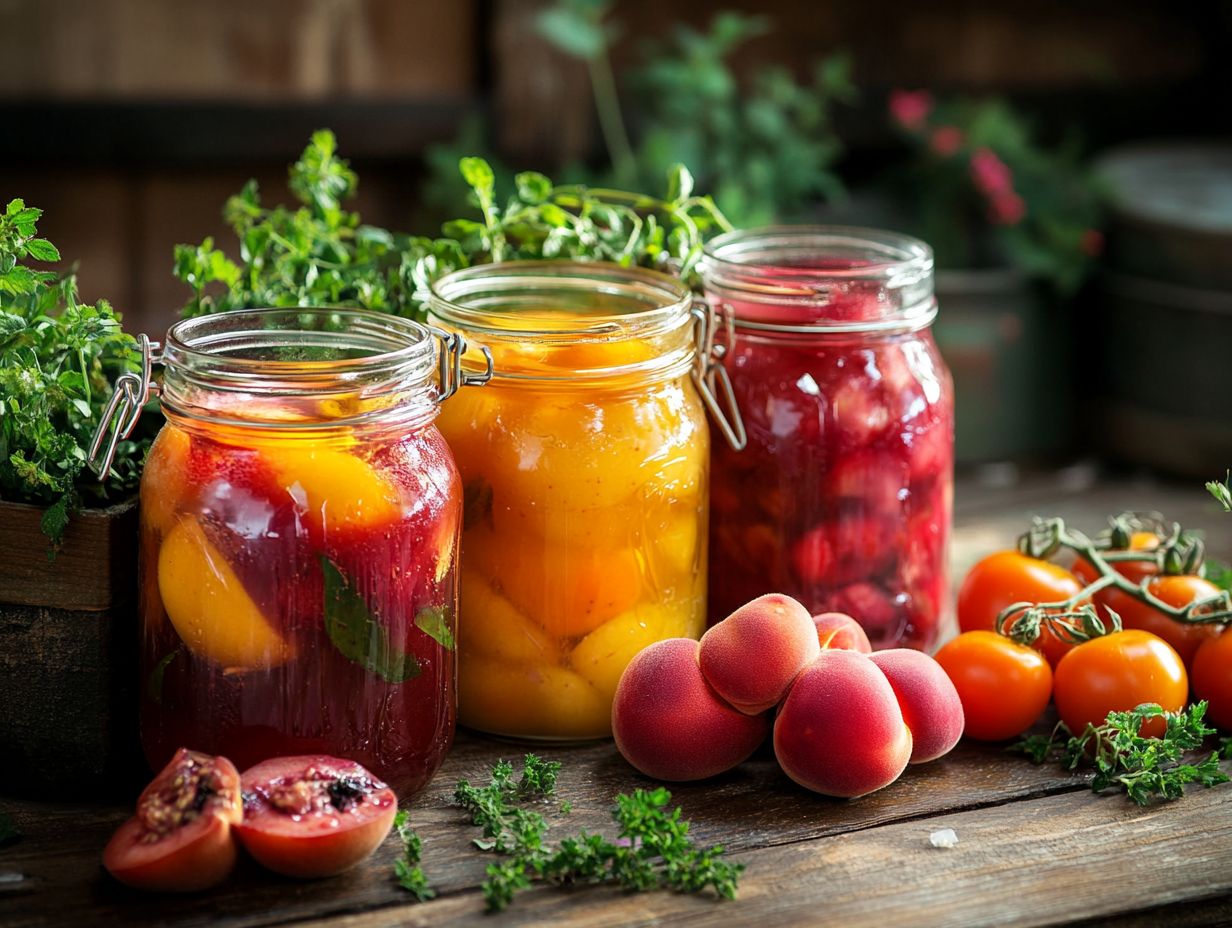
Identifying and selecting the right fruits is very important for canning successfully, especially when dealing with varieties like peaches, strawberries, and cherries that can easily become overripe.
Recognizing the perfect stage of ripeness allows you to capture the fruits’ peak flavor and sweetness, resulting in exceptional canned products. Mastering the art of gauging fruits for ideal ripeness is essential, as is knowing which seasonal varieties are best suited for preservation.
Best Fruits for Canning
The finest fruits for canning present a delightful array of options, including peaches, strawberries, and cherries. Each fruit infuses your preserves with vibrant flavors and natural sweetness.
Peaches have juicy and aromatic flesh that makes them a top choice for syrups or pie fillings. Their soft texture creates a beautifully smooth preserve, perfect for slathering on toast or elevating your desserts.
Strawberries strike a delightful balance between sweetness and tartness, making them ideal for jams or jellies that beautifully complement breakfast dishes like pancakes and yogurt.
Cherries offer a robust, rich flavor that shines in both sweet and savory applications, often making their way into chutneys or serving as a luscious topping for meats.
Each of these fruits not only enhances the visual appeal of your canned creations but also provides remarkable taste experiences to savor throughout the year.
Preparing Overripe Fruits for Canning
When preparing overripe fruits for canning, follow these exciting steps to ensure both safety and quality in your jars. Start by selecting fruits that are ripe but not spoiled; this is key to achieving the best results.
Next, give them a thorough wash to eliminate any dirt or contaminants that could compromise your work. Proper cutting techniques enhance the fruit’s texture and flavor while optimizing them for preserving, ultimately extending their shelf life.
Proper Cleaning and Cutting Techniques
Proper cleaning and cutting techniques are essential when preparing overripe fruits for canning, ensuring that they retain their quality and safety within the jars.
These methods enhance the fruits’ natural flavors and help extend their shelf life. Begin by rinsing the fruits thoroughly under cold running water, removing any dirt, pesticides, and bacteria that could jeopardize the integrity of your canned goods.
For softer fruits like peaches or pears, adopt a gentle approach utilize a paring knife to slice them into halves or quarters, and carefully discard any bruised or blemished areas.
In contrast, firmer fruits such as apples or pineapples should be sliced with precision to enhance their sweetness and prevent oxidation (which can make fruits brown). By following these best practices, you can guarantee a delightful and safe canning experience, making the most of your harvest while minimizing the risk of spoilage.
Methods for Canning with Overripe Fruits
When it comes to canning with overripe fruits, you have a variety of methods at your disposal. Techniques like water bath canning and pressure canning each offer unique advantages, tailored to the specific type of fruit and your preservation goals.
By selecting the right method, you ensure that your fruits are securely sealed, allowing them to maintain their delightful flavor and texture for months to come.
Don t wait to pick your fruits at their peak ripeness! The sooner you can them, the better the flavor and quality!
Water Bath and Pressure Canning
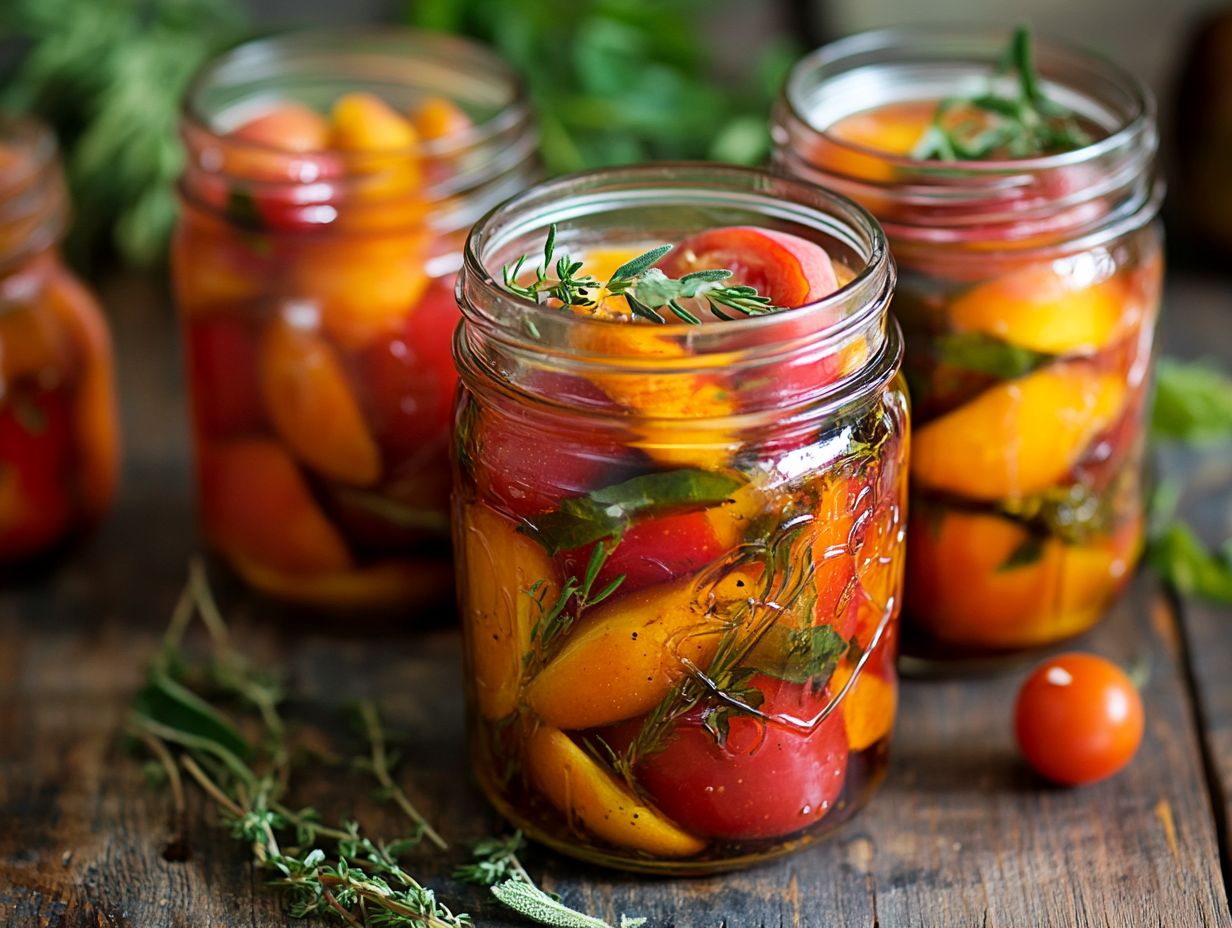
Water bath and pressure canning are two essential methods for preserving overripe fruits. Each method is tailored to specific types of produce while ensuring safety throughout the canning journey.
Understanding the differences between these techniques is crucial for achieving successful results in fruit preservation. Water bath canning is perfect for fruits that are acidic like strawberries, peaches, and tomatoes, which can be safely processed at boiling temperatures (212 F).
As you navigate this method, pay close attention to processing times, which typically range from 5 to 15 minutes. These times depend on the fruit and jar size.
You must use pressure canning for fruits that are not acidic, such as most vegetables and meats. This method operates at higher temperatures (240 F or above) to eliminate harmful bacteria.
Pressure canning requires precise temperature control and adjustments based on your altitude. It is vital to follow USDA guidelines closely to ensure safety.
Storing and Using Canned Overripe Fruits
Storing and using canned overripe fruits requires understanding proper storage techniques to extend their shelf life. Proper storage also enhances the flavors in your culinary creations.
Ensure that your jars are properly sealed and stored in a cool, dark location to preserve their freshness. Get ready to elevate your meals with these delicious preserved fruits!
Top Tips for Storing and Creative Ways to Use Canned Fruits!
Proper storage techniques are essential for ensuring your canned overripe fruits retain their quality and flavor. Creative recipe ideas can inspire delightful uses for these preserved gems.
To achieve optimal storage, keep those cans in a cool, dark place with a consistent temperature, ideally between 50-70 F. Excessive light and heat can rob them of their taste and nutritional value.
When it’s time to bring out these canned delights, consider crafting a vibrant fruit salad:
- Combine the canned fruits with fresh herbs.
- Toss them into smoothies for that extra touch of sweetness.
You can also bake them into muffins or cakes, where the natural sugars from the fruits enhance both flavor and moisture. Each of these imaginative approaches adds a burst of zest to your meals while helping to reduce waste.
Frequently Asked Questions
What does it mean to can overripe fruits?
Canning overripe fruits means preserving them by sealing them in airtight containers for later use.
Why should I can overripe fruits instead of throwing them away?
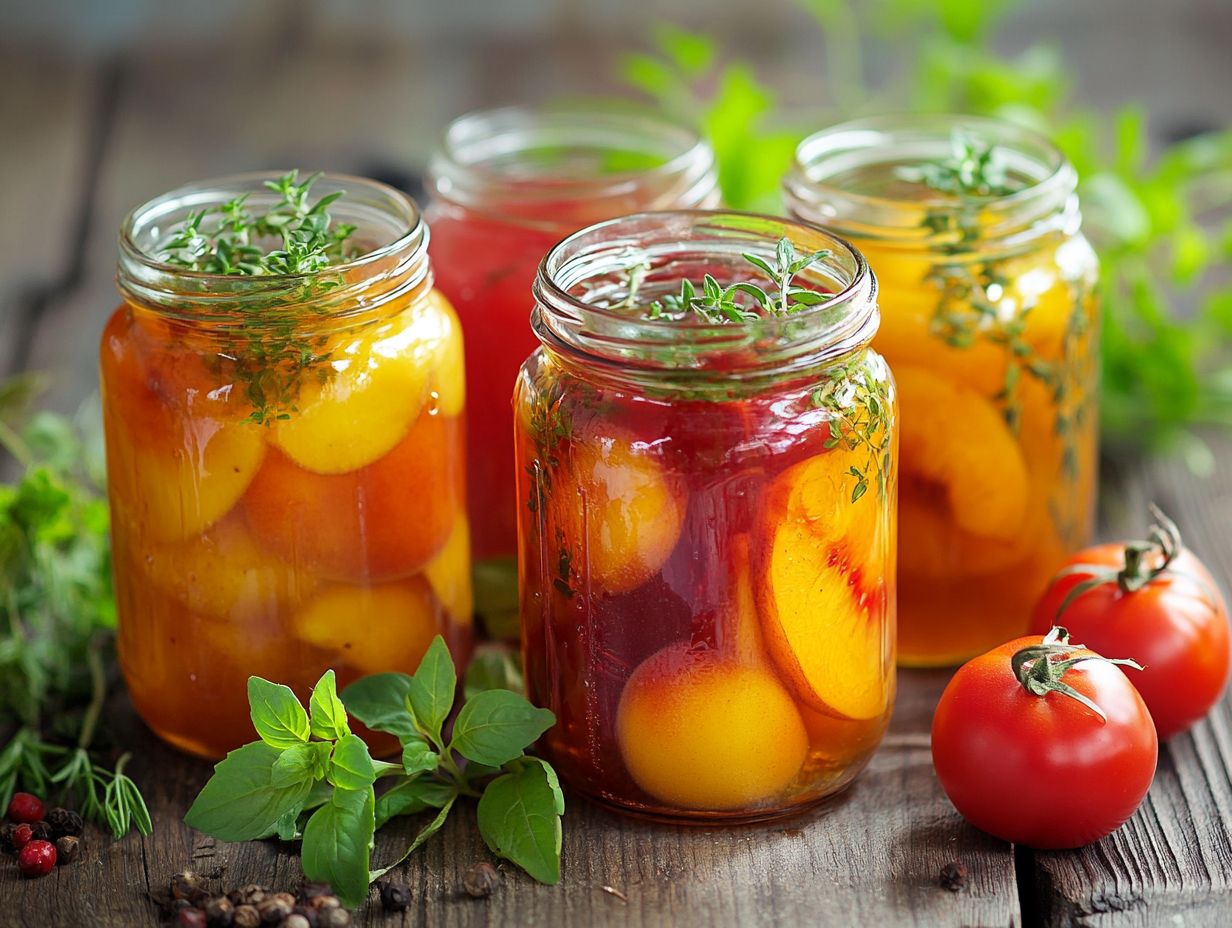
Canning overripe fruits helps save them from being wasted, allowing you to enjoy them later when they are no longer available in stores.
How do I make overripe fruits shine in canning?
To make overripe fruits shine in canning, add a small amount of lemon juice or citric acid to the fruit mixture to help preserve their color.
What type of containers should I use for canning overripe fruits?
It is recommended to use glass jars with tight-fitting lids for canning overripe fruits. Mason jars are a popular choice.
Do I need to add any preservatives when canning overripe fruits?
No, you do not need to add preservatives. The airtight containers and proper processing techniques act as natural preservatives.
Can I can any type of overripe fruit?
Yes, you can can any type of overripe fruit. However, ensure the fruits are not spoiled or moldy before canning.
Don’t wait! Start your canning adventure today and enjoy the flavors of summer all year round.

